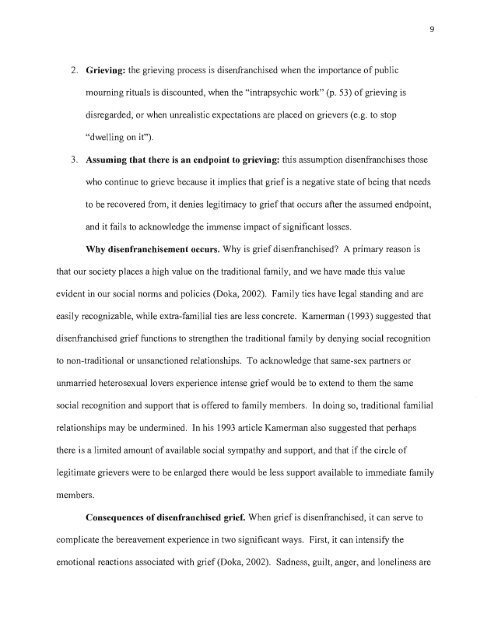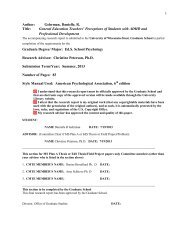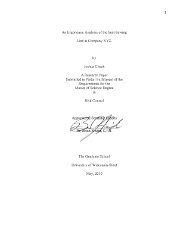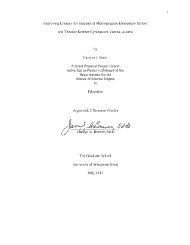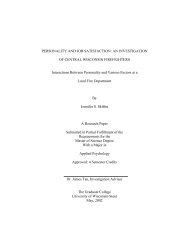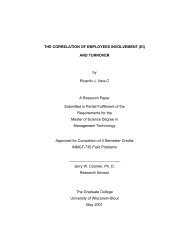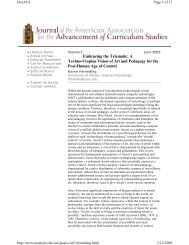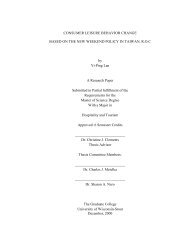A Review of the Literature on Three Types of Disenfranchised Grief ...
A Review of the Literature on Three Types of Disenfranchised Grief ...
A Review of the Literature on Three Types of Disenfranchised Grief ...
You also want an ePaper? Increase the reach of your titles
YUMPU automatically turns print PDFs into web optimized ePapers that Google loves.
2. Grieving: <str<strong>on</strong>g>the</str<strong>on</strong>g> grieving process is disenfranchised when <str<strong>on</strong>g>the</str<strong>on</strong>g> importance <str<strong>on</strong>g>of</str<strong>on</strong>g> public<br />
mourning rituals is discounted, when <str<strong>on</strong>g>the</str<strong>on</strong>g> "intrapsychic work" (p. 53) <str<strong>on</strong>g>of</str<strong>on</strong>g> grieving is<br />
disregarded, or when unrealistic expectati<strong>on</strong>s ate placed <strong>on</strong> grievers (e.g. to stop<br />
"dwelling <strong>on</strong> it").<br />
3. Assuming that <str<strong>on</strong>g>the</str<strong>on</strong>g>re is an endpoint to grieving: this assumpti<strong>on</strong> disenfranchises those<br />
who c<strong>on</strong>tinue to grieve because it implies that grief is a negative state <str<strong>on</strong>g>of</str<strong>on</strong>g> being that needs<br />
to be recovered from, it denies legitimacy to grief that occurs after <str<strong>on</strong>g>the</str<strong>on</strong>g> assumed endpoint,<br />
and it fails to acknowledge <str<strong>on</strong>g>the</str<strong>on</strong>g> irrunense impact <str<strong>on</strong>g>of</str<strong>on</strong>g> significant losses.<br />
Why disenfranchisement occurs. Why is grief disenfranchised? A primary reas<strong>on</strong> is<br />
that our society places a high value <strong>on</strong> <str<strong>on</strong>g>the</str<strong>on</strong>g> traditi<strong>on</strong>al family, and we have made this value<br />
evident in om social norms and policies (Doka, 2002). Family ties have legal standing and are<br />
easily recognizable, while extra-familial ties are less c<strong>on</strong>crete. Kamerman (1993) suggested that<br />
disenfranchised grief functi<strong>on</strong>s to streng<str<strong>on</strong>g>the</str<strong>on</strong>g>n <str<strong>on</strong>g>the</str<strong>on</strong>g> traditi<strong>on</strong>al family by denying social recogniti<strong>on</strong><br />
to n<strong>on</strong>-traditi<strong>on</strong>al or unsancti<strong>on</strong>ed relati<strong>on</strong>ships. To acknowledge that same-sex partners or<br />
unmarried heterosexual lovers experience intense grief would be to extend to <str<strong>on</strong>g>the</str<strong>on</strong>g>m <str<strong>on</strong>g>the</str<strong>on</strong>g> same<br />
social recogniti<strong>on</strong> and support that is <str<strong>on</strong>g>of</str<strong>on</strong>g>fered to family members. In doing so, traditi<strong>on</strong>al familial<br />
relati<strong>on</strong>ships may be undermined. In his 1993 article Kamerman also suggested that perhaps<br />
<str<strong>on</strong>g>the</str<strong>on</strong>g>re is a limited amount <str<strong>on</strong>g>of</str<strong>on</strong>g> available social sympathy and support, and that if <str<strong>on</strong>g>the</str<strong>on</strong>g> circle <str<strong>on</strong>g>of</str<strong>on</strong>g><br />
legitimate grievers were to be enlarged <str<strong>on</strong>g>the</str<strong>on</strong>g>re would be less support available to irrunediate family<br />
members.<br />
C<strong>on</strong>sequences <str<strong>on</strong>g>of</str<strong>on</strong>g> disenfranchised grief. When grief is disenfranchised, it can serve to<br />
complicate <str<strong>on</strong>g>the</str<strong>on</strong>g> bereavement experience in two significant ways. First, it can intensify <str<strong>on</strong>g>the</str<strong>on</strong>g><br />
emoti<strong>on</strong>al reacti<strong>on</strong>s associated with grief (Doka, 2002). Sadness, guilt, anger, and l<strong>on</strong>eliness are<br />
9


